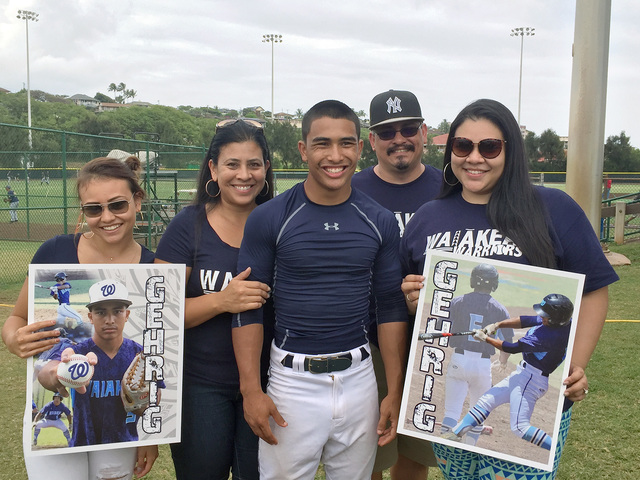Wright On: What’s in a name? – everything for Octavios

It’s the one thing we all share, old, young, either gender, all races and religions.
ADVERTISING
Sometimes, a name is predetermined by family history, other times it selected because it sounds about right, sometimes names are thick with real meaning to that specific family.
If you work in a newspaper sports department for a while, you will find yourself paying particular attention to names because at some point, we all take phone calls on high school sports just before deadline. We are always in a hurry, we make it brief and move the copy through the system, then after deadline, some of those names come back at us.
Everyone I know who has spent a good deal of time in a newspaper sports department has a personal way of sifting names through a mental screening that allows a few to fall through. You know there’s a story behind these names even if you can’t always get to the source.
That’s where this story came from. It happened a while back, watching Waiakea High School’s football team in preseason practice while talking to coach Moku Pita. He said some nice things about senior quarterback Gehrig Octavio. I asked him to repeat the name, then to spell the first name.
Turns out, unsurprisingly, his father, Luke, is one of those full-time, totally committed fans of the New York Yankees and Lou Gehrig, who ranks among the greatest players in Major League Baseball history, among all teams. But you knew Luke wasn’t old enough to have ever watched Gehrig play — his last game was in 1939, in April, the start of the season and end of a career — and you wondered why not Babe Ruth, Mickey Mantle, Thurman Munson, why Gehrig?
“He was our third child,” said Gehrig’s mother Cheryl, “the first two were girls (Choncie, 25, and Cheylee, 20), and I kind of liked those names, but this time we agreed Luke could name the child.
“One day he told me he decided on Gehrig,” she said. “I told him, like immediately, ‘We are not naming our son with somebody’s last name, it doesn’t even sound right,’ but as time went on I thought about and it grew on me.”
The Yankee fan in the family had his reasons.
“I wanted a name that would represent something, that could be an inspiration or a motivator, that kind of thing,” Luke said. “Lou Gehrig did not know what was happening to him when he started getting sick, nobody knew, but he kept at it, he became tenacious in his preparation and conditioning, he never complained, not even one time.”
The disease, now known in this country as Lou Gehrig’s Disease, clinically understood as amyotrophic lateral sclerosis or ALS, is an incurable neuromuscular disease that kills from the inside out. The mind works as well as ever, but the body weakens, disintegrating increasingly as bodily functions shut down, until death. The victim is trapped in a body from which escape is impossible.
“He just worked and worked and prepared for his chance,” Cheryl said. “One day Wally Pip didn’t feel up to it, they put Gehrig in and he kept that position for the rest of his career. He had fractures in his hands he never discussed, people didn’t know he had all these back spasms. He would not quit.”
Luke also liked the symbolism of Gehrig’s nickname, the Iron Horse, but Gehrig stood 6-feet tall, barely 200 pounds. In a lineup of first base prospects today, he’d be sent to the end of the line, but it wasn’t his frame that made Gehrig one of the all-time greats, it was what he had inside. This is a guy who averaged 37 home runs and 149 runs batted in per season in that otherwise normal physical frame.
Years ago Luke became friends with Buddy Perry, a youth soccer coach in Puna. Perry was impressed by Gehrig and asked his father if he would consider sending him to Puna for soccer, on Perry’s team.
Cheryl thought it made no sense when she heard about it, but Luke felt it was right to send his son to be coached by a guy he knew and respected. Perry agreed to send his son to play for the youth baseball team Luke coached.
In time, Gehrig took to the game, liked it and has become a skilled soccer player these days when he’s not playing football or baseball.
Then it happened.
Seven years ago Buddy Perry was diagnosed with ALS, Lou Gehrig’s disease.
“Gehrig had the name but we had never known anyone who had the disease,” Luke said, “and it turned out this great man who took a special interest in my son, who taught him to love soccer, was the guy who had it.
“It was devastating,” Luke said. “Buddy died in about two years. We know the suffering you go through now, we’ve seen with our own eyes the determination, the desire, the expectation he had to keep going. Gehrig saw it, he knows the full meaning of name now.”
Gehrig Octavio might have a baseball future beyond high school, not because he has a ballplayer’s name, more because he takes life and his place in it more seriously than a lot of kids. It is not unusual for him to be up at 5 AM to get in the weight room before school. He will do everything required and then he’ll do a little more.
These days, their son’s name sounds like it belongs in the family.


